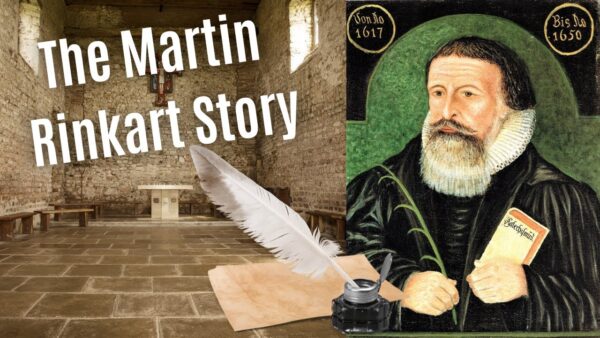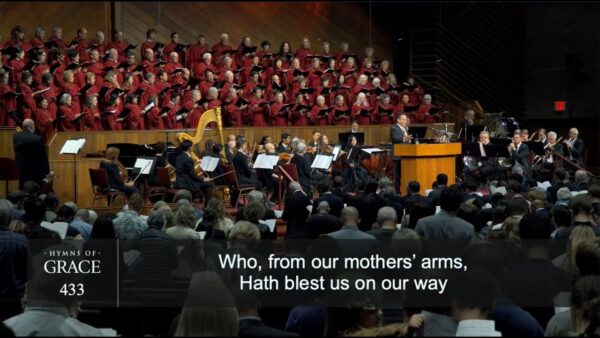By Harold Pease, Ph. D.
This is the season to be grateful and to acknowledge our many blessings, even in the midst of extreme difficult times for so many of our neighbors and friends. Even our own circumstances may have brought us beneath what we think we can endure. During such times it is sometimes hard to find things to be grateful for or to find the hand of God in anything. Finding someone whose life circumstances are much worse sometimes helps a little. One such was Martin Rinkart. He authored the beloved Christian hymnal “Now Thank We All Our God” which has given fellow Christians strength in their trials for almost 400 years.

In 1637 the Swedes and Germans were in the midst of The Thirty-Year War (Catholics vs. Protestants) and refugees from that encounter were flooding into Eilenburg, Saxony where Martin Rinkart was serving as Archdeacon of his native German town. A horrible plaque gripped the area leaving some 8,000 persons dead in a single year. Rinkart had to assist “at the beds of the sick and dying.” Although fortunately he maintained his own health during this time of death, he “had to read forty or fifty funeral services a day” including the services of two of his fellow clergymen. A fourth ran away, out of fear of getting sick, leaving him the lone church authority in this major crisis. He assisted in burying some 4,480 in all. In May of that year, his wife died. “By the end of the year, the refugees had to be buried in trenches without Services.
This horror was followed by a famine “so extreme that thirty or forty persons might be seen fighting in the streets for a dead cat or crow.” As the head of the church in his area “his door was surrounded by a crowd of poor starving wretches, who found it their only refuge.” He shared everything he had reserving “the barest rations for his own family.”
Next the Swedes returned demanding a tribute of $30,000 from the town. Such money was not available. After failing to entreat the invading general for mercy, Rinkart turned to those following him and, in the general’s presence, said “Come, my children, we can find no hearing, no mercy with men, let us take refuge with God.” He then “fell on his knees and prayed with such touching earnestness that the Swedish general relented, and lowered his demand at last to 2,000 florins.”

Apparently the words of his hymn were originally written as a grace to be said before meals but given his circumstances it became a song of strength in adversity. Listen to them. “Now thank we all our God with hearts and hands and voices, Who wondrous things hath done, In whom his earth rejoices; Who, from our mothers’ arms, Hath blessed us on our way With countless gifts of love, And still is ours today.” The first verse of this Lutheran hymnal is certainly a message of thanksgiving; the second, one of protection and guidance. “Oh, may our bounteous God Through all our life be near us, With ever joyful hearts and blessed peace to cheer us, And keep us in his love, And guide us day and night, And free us from all ills, Protect us by his might.”—Martin Rinkart, c. 1636
Amazingly Rinkart could find God and write praises to him in the midst of the most horrendous circumstances of war, famine, plague, and death around him. The tune came from noted hymn composer Johann Crüger, and its common harmonization derives from its use in an 1830 cantata by German composer Felix Mendelssohn. “Thanksgiving During a Plague: Martin Rinkart (1586–1649).” Rinkart was a deacon at Eisleben and archdeacon at Eilenburg, where he was born and also died. (Religious Affections Ministries, Nov. 25, 2020).
Perhaps his life and song can make us stronger as well. At the very least it should give us a few extra things for which to be thankful. None of us are fighting over a dead cat or crow to eat. Despite our obstacles, deep inside we know that God still has our best interests in mind. When we next sing this song we will probably do it with more gratitude reflecting, at least for a moment, on our great blessings, as he did, rather than our trials.
Dr. Harold Pease is an expert on the United States Constitution and a syndicated columnist. He has dedicated his career to studying the writings of the Founding Fathers and applying that knowledge to current events. He taught history and political science from this perspective for over 30 years at Taft College. Newspapers have permission to publish this column. Read his weekly columns at www.LibertyUnderFire.org Column # 795
Subscribe now for free columns at this address. Help preserve our Republic while we still can by sharing this column.
